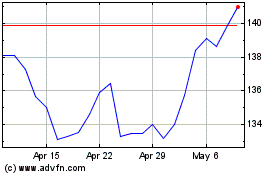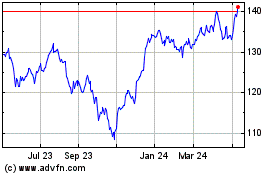By Vipal Monga
This article is being republished as part of our daily
reproduction of WSJ.com articles that also appeared in the U.S.
print edition of The Wall Street Journal (February 24, 2018).
NEW YORK -- Royal Bank of Canada has focused its U.S. ambitions
on its capital markets unit. Its first-quarter results suggest the
efforts may be starting to pay off.
The bank's unit, its second-largest by profit, reported record
net income of 748 million Canadian dollars ($591 million) during
its fiscal first quarter, up 13% from a year prior.
Those results helped propel quarterly earnings at RBC, which has
the largest market capitalization of the Canadian banks, to C$3.01
billion, or C$2.01 a share. The results compared with C$3.03
billion, or C$1.97 a share, in the year-earlier period, which
contained a C$212 million benefit from the sale of payment
processor Moneris Solutions Corp.'s U.S. operations.
The bank also recorded a C$178 million charge during the quarter
from U.S. tax reform as it wrote down the value of net deferred tax
assets. Its share price rose 0.8% in Friday trading to $81.11 on
the New York Stock Exchange.
The lender's efforts in capital markets have been costly, but
the quarter showed the investments are yielding some return. While
noninterest expense in the capital markets unit, which includes
compensation, rose 8% from a year ago to C$1.21 billion,
return-on-equity, a measure of how well the bank uses investments
to boost profits, rose to 14.7% from 13.3% a year ago.
Despite the strong quarter, RBC Capital Markets recorded a 3%
drop in its loan balances compared with a year earlier. Since the
first quarter of 2016, loan balances have dropped 9%. The declines
suggest that the bank has been pulling back on its lending, as it
isn't getting as much other business from borrowers as it would
like, said Gabriel Dechaine, analyst with National Bank of
Canada.
In a call with analysts Friday, Doug McGregor, group head of RBC
Capital Markets, said the bank would grow the balance sheet again
but "more modestly than we did several years ago."
And RBC is finding a tough competitive environment on Wall
Street. The bank slipped out of the top 10 investment banks by
revenue in the U.S. last year, according to Dealogic, with newly
emboldened rival Jefferies LLC leapfrogging the Canadian bank in
the league tables by aggressively lending money to highly indebted
companies.
To counter its decline and nudge its U.S. market share from 2.8%
to its goal of 4%, RBC has been taking fresh steps to bolster its
investment-banking arm.
Behind the moves is the head of the U.S. investment bank, Blair
Fleming, who has sought to shed the image of RBC as an overly
cautious Canadian lender since he took the helm of its New York
investment bank in 2009. On his first day in the office, he removed
an award on the wall that congratulated RBC as "mid-market
investment bank of the year."
"We weren't going to get where we wanted to be as a mid-market
bank," Mr. Fleming said in a recent interview.
He has led RBC in luring bankers from rivals that who have hit
rough patches, such as Deutsche Bank AG, and snagging advisory and
lending roles in multibillion-dollar acquisitions for clients such
as tech company Computer Sciences Corp., private-equity firm Silver
Lake Group LLC and utility Sempra Energy.
Recently, the bank has worked to create a restructuring group
and one to advise companies on defending themselves against
activist shareholders.
Last month, the bank hired Keith Murray from BNP Paribas to
finance companies that earn between $25 million and $50 million a
year, the idea being such firms will continue as clients of the
bank as they grow larger. RBC also hired Stavros Tsibiridis in
December from Wells Fargo to help boards defend themselves against
corporate activists.
Those hires aim to expand the brand, said Mr. Fleming. He refers
to the strategy as "high touch," meaning the bank ultimately will
benefit with more business if advisers have more ways of staying in
touch with board members and executives.
RBC also has tried to boost its wealth-management and commercial
banking by purchasing City National Bank, known as Hollywood's
bank, in 2015.
Dave McKay, RBC's chief executive, said the bank hopes to bring
City National's well-heeled, business-owning clients to the capital
markets unit.
"They have a respectable U.S. business," said analyst Mr.
Dechaine. "The question is, can they make it a dominant one?"
On Friday, RBC said it was raising its quarterly dividend to
C$0.94 from C$0.91, and it authorized a new program to buy back up
to 30 million shares over the next 12 months.
--Allison Prang in New York contributed to this article.
Write to Vipal Monga at vipal.monga@wsj.com
(END) Dow Jones Newswires
February 24, 2018 02:47 ET (07:47 GMT)
Copyright (c) 2018 Dow Jones & Company, Inc.
Royal Bank of Canada (TSX:RY)
Historical Stock Chart
From Mar 2024 to Apr 2024

Royal Bank of Canada (TSX:RY)
Historical Stock Chart
From Apr 2023 to Apr 2024
